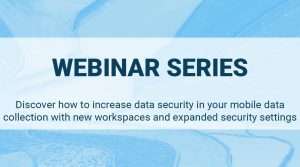Social impact organizations are using SurveyCTO to accelerate, automate, and accentuate their fieldwork research
In hospitals across India, Noora Health’s Care Companion Program (CCP) is enhancing patient care by teaching family members of patients the skills to care for loved ones. This initiative has dramatically improved recovery outcomes, reducing post-surgical complications by 71% (one of the strongest predictors of mortality for this patient population). To manage this, Noora Health employs SurveyCTO, a mobile data collection tool, to monitor over 1,200 patient families monthly, gather attendee feedback, and conduct program audits.
With programs and beneficiaries spread across India, it was challenging for field-based investigators to conduct follow-ups using paper-based surveys as well as to reach patients and families located far from their central office. The switch to phone surveys and the adoption of SurveyCTO have significantly streamlined operations across Noora Health’s widespread programs.
With SurveyCTO, Noora Health can now collect data on the same device used for phone calls, eliminating the need for multiple devices. Additionally, they are using SurveyCTO to empower other team members who typically wouldn’t interact with field-based survey software to capture more qualitative data and conduct design-type interviews. This approach allows Noora Health to centralize the data collection process.
The importance of mobile data collection for fieldwork research
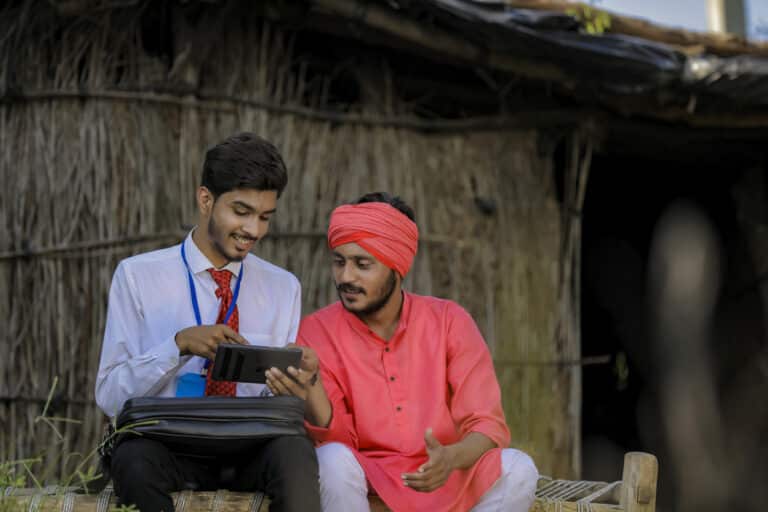
As the Noora example above highlights, the adoption of mobile data collection technology has transformed fieldwork research across the globe. Mobile data collection eliminates many of the traditional challenges of field-based studies, including logistical complications, high costs, time constraints, and data accuracy issues.
Instead, with a robust mobile data collection tool, researchers can gather real-time data. The flexibility to collect and analyze data on the go, even in offline environments, means that organizations can quickly implement interventions, track efficiencies in real-time, and significantly enhance their decision-making.
Whether it’s in health research, economic studies, humanitarian efforts, or something else, SurveyCTO’s robust mobile data collection platform is proving to be an indispensable tool for fieldwork research. To give you an idea of the potential, here are 8 additional real-world applications across a variety of use cases.
1. Automating data collection in the field
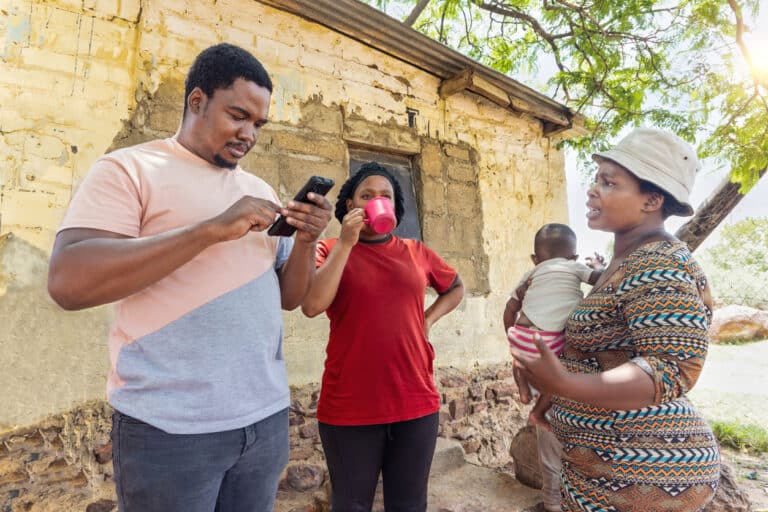
In Ethiopia, Christian Meyer, a doctoral student at the European University Institute, was conducting research focused on the decision-making processes of young women in the country’s burgeoning manufacturing industry. His work centered on the Hawassa Industrial Park Sourcing and Training Employees in the Region (HIPSTER) program.
Christian’s research methodology included randomly selecting workers for the study and conducting face-to-face interviews, followed by phone interviews every two weeks over a series of eight follow-ups. With new groups of participants recruited weekly, managing such a large and dynamic study posed substantial administrative challenges for a small team, particularly in maintaining accurate follow-up schedules.
To address these complexities, Christian used SurveyCTO’s case management functionality, which streamlines creating and updating participant cases and enhances the management of large-scale data collection. He has further optimized the efficiency of mobile data collection and program management by integrating SurveyCTO with Google Sheets and Zapier.
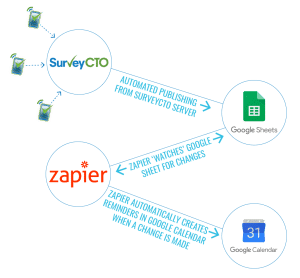
This automated process facilitates real-time tracking and updates via a centrally managed dashboard, monitored by his field manager to ensure smooth information flow and timely follow-ups. By automating routine tasks like scheduling and sending reminders through Google Calendar and SMS, the field team was able to rigorously adhere to the study’s timeline, significantly enhancing overall project management.
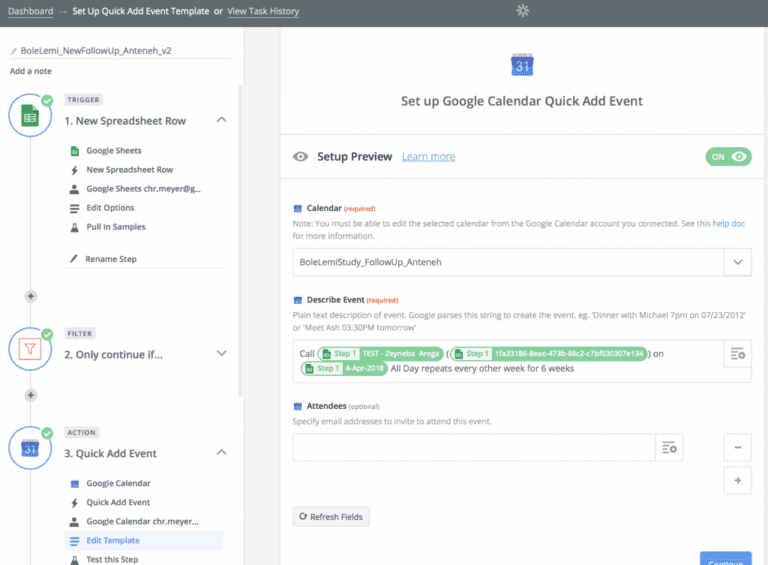
2. Managing expanded survey volumes with success
Outline India, a research firm committed to delivering high-quality data for social impact, faced a substantial challenge during the COVID-19 pandemic. Tasked with conducting phone surveys in Madhya Pradesh, India, they initially expected to survey 3,000 respondents. However, due to the unique challenges posed by phone surveys, including higher attrition rates, the sample size unexpectedly expanded to 15,000. This required a significant escalation in their data collection capabilities and the management of a much larger volume of respondents than anticipated.
To efficiently manage this surge and maintain data quality, Outline India turned to SurveyCTO’s computer-assisted telephone interviewing (CATI), case management tools, and phone-call field plug-in. These features enabled seamless integration with existing data collection processes, allowing field workers to automate the distribution of respondent lists, make calls directly from SurveyCTO Collect on their mobile devices, and pull essential respondent information dynamically during interviews.
Using a mobile data collection platform with built-in CATI functionality not only minimized mistakes and reduced bias, but its features for tracking and recording the status of each call in a phone survey (call dropped, not available, busy, etc.) simplified project management and reporting. Finally, being able to build a real-time data monitoring system helped not only with quality checks but in visualizing it for stakeholders during collection, allowing for the project to be adjusted as needed per the client’s request.
3. Improving data integrity and efficiency in sensitive research
In coastal Kenya, the NORC at the University of Chicago conducted an innovative study to measure the prevalence of Commercial Sexual Exploitation of Children (CSEC) using respondent-driven sampling (RDS), also called “snowball sampling.” This method is particularly effective for reaching hidden populations, such as victims of child sex trafficking, which are typically challenging to access due to the sensitive nature of the information and the reluctance of respondents to participate in traditional surveys. Using SurveyCTO, NORC was able to systematically manage the data collected through this complex sampling technique, ensuring more accurate and timely research outcomes.
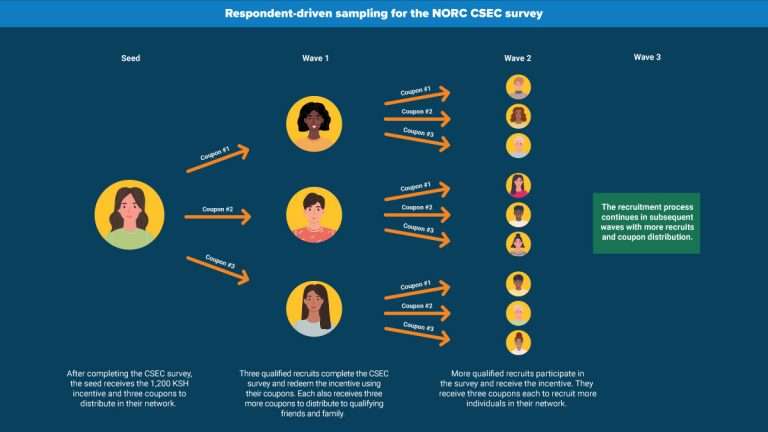
For this study, NORC used paper coupons with QR codes to both deliver incentives and observe network links between the respondents. Each participant was given uniquely coded coupons to distribute within their network, facilitating the tracking of referral chains and the recruitment of new study participants. This method not only minimized data entry errors but also prevented fraudulent entries, enhancing the reliability of the research data. As each coupon was scanned and validated via SurveyCTO, researchers could immediately verify its authenticity, ensuring that only valid data entered the system.
NORC also used SurveyCTO to monitor the data as they came in. “I’ve been able to see who’s redeeming the coupons and have also been able to see that primary respondents have referred other people,” said Erika Keaveney, Senior Research Scientist at NORC.
4. Enhancing longitudinal studies with SurveyCTO's unique ID feature
The Hague Institute for Innovation of Law (HiiL) utilizes SurveyCTO’s mobile data collection tools to support its mission of creating more equitable justice systems. During global lockdowns, HiiL’s Justice Innovation project in Uganda transitioned from traditional face-to-face interviews to remote data collection using SurveyCTO’s web forms and unique IDs.
This adaptation allowed them to continue their crucial research, reach respondents through social media, and securely link survey data across multiple project phases. The introduction of unique IDs enabled longitudinal tracking of individual responses, significantly improving data accuracy and consistency throughout the survey waves.
HiiL’s strategic use of SurveyCTO web forms captured a “before-and-after” view of the justice issues faced by Ugandans, effectively adapting their complex survey design for an online environment. Embedding unique identifiers in survey URLs ensured that follow-up surveys were completed by the same respondents, preserving the integrity of the longitudinal study. This approach streamlined the data collection process, enhanced survey security and personalization, and minimized errors and duplications.
This method proved not only cost-effective but also easily replicable in other regions, greatly enhancing HiiL’s global impact and efficiency in their quest for equitable justice reform.
5. Overcoming connectivity challenges in rural fieldwork research
Innovations for Poverty Action (IPA) in Sierra Leone has effectively leveraged SurveyCTO’s advanced offline features to enhance political candidate discovery and streamline the data collection process in remote and internet-limited settings. This project aimed to empower rural communities to nominate candidates for local council positions, thereby improving the quality of political representation and increasing local participation in governance. However, due to the geographical spread and infrastructure challenges in rural Sierra Leone, traditional data collection methods were inadequate and time-consuming, often requiring extensive manual data cleaning and entry.
With SurveyCTO’s offline dataset publishing features, IPA was able to transform its data collection workflow. This technology allowed enumerators to access a pre-populated list of already-nominated individuals, significantly reducing the need for repeated data entry and minimizing errors. By maintaining local copies of server datasets directly on field devices, enumerators could update data in real-time without needing an internet connection. This setup not only made the data collection process more efficient and user-friendly but also ensured higher data accuracy and integrity.
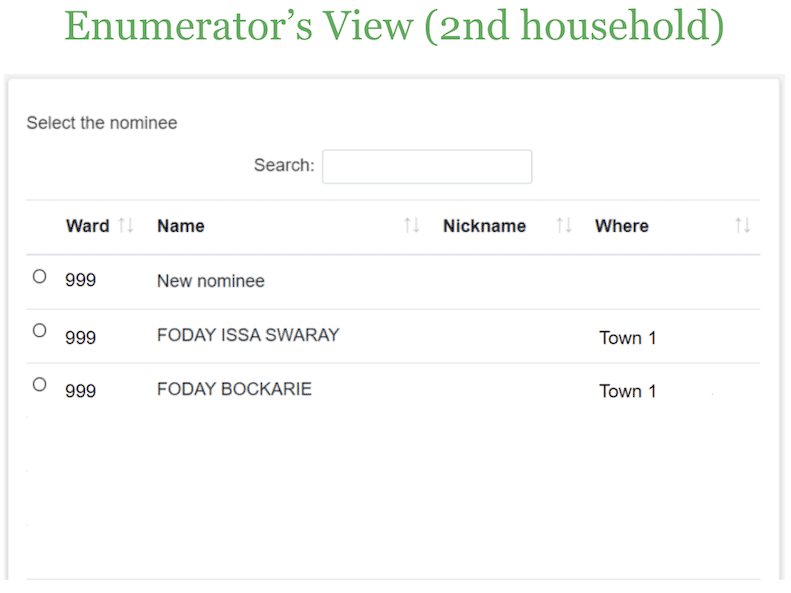
The result of implementing these advanced offline features was that IPA was able to reduce the time required for each survey by 50%, greatly increasing the efficiency of the data collection process and reducing respondent-related costs by 50%. Additionally, the number of surveys conducted in each community increased by 50%, demonstrating a marked improvement in the project’s scope and reach.
6. Enhancing data collection during lockdown with CATI technology
The International Food Policy Research Institute (IFPRI), a leader in global agricultural and food policy research, faced significant data collection challenges due to the COVID-19 pandemic, particularly in the Gujarat region of India and the Dang Region of Nepal. Prior to the pandemic, IFPRI had planned in-person data collection, but lockdowns necessitated a swift shift to phone-based surveys. Using SurveyCTO’s Computer-Assisted Telephone Interviewing (CATI) feature, IFPRI could continue their research without physical interaction. This feature allowed enumerators to conduct interviews and enter data directly on their mobile devices, significantly reducing potential errors and inefficiencies that would have arisen from using pen-and-paper methods in a non-traditional phone survey setting.
IFPRI also relied on SurveyCTO’s data quality and call recording capabilities to ensure data reliability and accuracy, further supported by the platform’s case management tools alongside the CATI features, which helped track respondents across multiple survey rounds.
This adaptive approach enabled IFPRI to successfully gather critical data that revealed the significant economic impacts of the pandemic on vulnerable populations, including loss of income and decreased food expenditure among surveyed individuals. This high-quality data was crucial for informing local governments and NGOs, enabling them to make better-informed decisions and allocate aid effectively during the crisis.
7. Managing complex data flows in an offline environment
Since 2007, Handicap International – Humanity & Inclusion (HI) has been active in Cox’s Bazar, a coastal city in Bangladesh home to 33 refugee camps with over 1 million displaced Rohingya people. Using SurveyCTO’s mobile data collection features, HI effectively manages and delivers a range of essential services, such as physical and functional rehabilitation, mental health support, and inclusive education.
Beneficiaries often receive concurrent services from different teams, including Rehabilitation, Mental Health and Psychosocial Support (MHPSS), Protection, and Nursing. SurveyCTO enables HI to conduct sophisticated data management tasks, including screening potential beneficiaries, registering them with unique IDs and barcodes, and tracking their various medical appointments. HI also relies on SurveyCTO to support user-friendly information sheets that make it easier for their staff to accommodates multiple service needs simultaneously for refugees.
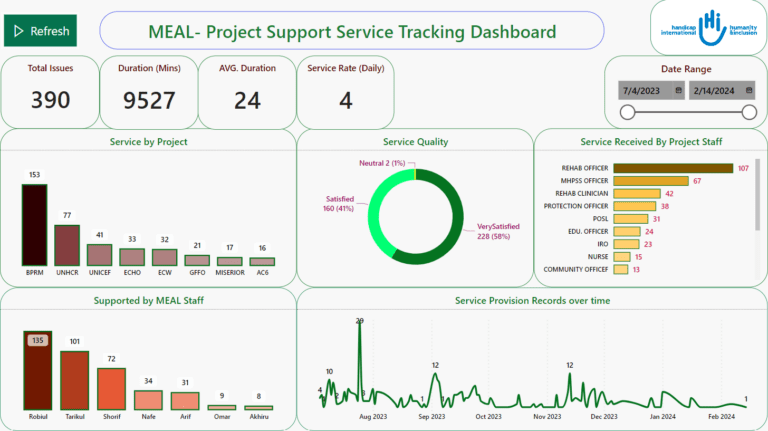
To cope with the unreliable internet connectivity in Cox’s Bazar, HI leverages SurveyCTO’s offline functionalities. Field workers can complete forms on-site and later sync them by downloading the latest versions of forms and datasets using SurveyCTO’s Refresh feature. This capability ensures continuous operation and data integrity, allowing HI to maintain high standards of care and support for refugees under challenging conditions.
8. Creating an Electronic Medical Records system with the help of SurveyCTO
Nyaka, an organization dedicated to supporting vulnerable children in Uganda, faced significant challenges in managing medical records efficiently due to reliance on traditional pen-and-paper methods. This approach was cumbersome, error-prone, and limited the ability of healthcare providers to access vital patient information quickly. To address these issues, Nyaka adopted SurveyCTO, a platform familiar to Paul Nzerebende, Nyaka’s then-MEAL Manager.
SurveyCTO facilitated the transition from paper-based to digital data collection, enabling Nyaka to track medical consultations, vaccinations, and other critical health data more effectively. In addition, by leveraging his experience with SurveyCTO and Google Data Studio, Paul developed an Electronic Medical Records (EMR) system using interactive dashboards that integrated data from SurveyCTO into Google Sheets.
This innovation allowed health workers to access and update patient records on mobile devices via the SurveyCTO Collect app during consultations, significantly enhancing the efficiency and accuracy of data management. The digital EMR system empowered healthcare providers to offer immediate medical advice and improved the overall operations of Nyaka’s clinics.
Adopt a robust mobile data collection tool like SurveyCTO to improve accuracy, efficiency, and enable real-time data analysis. Start a free trial or request a demo to learn more.



